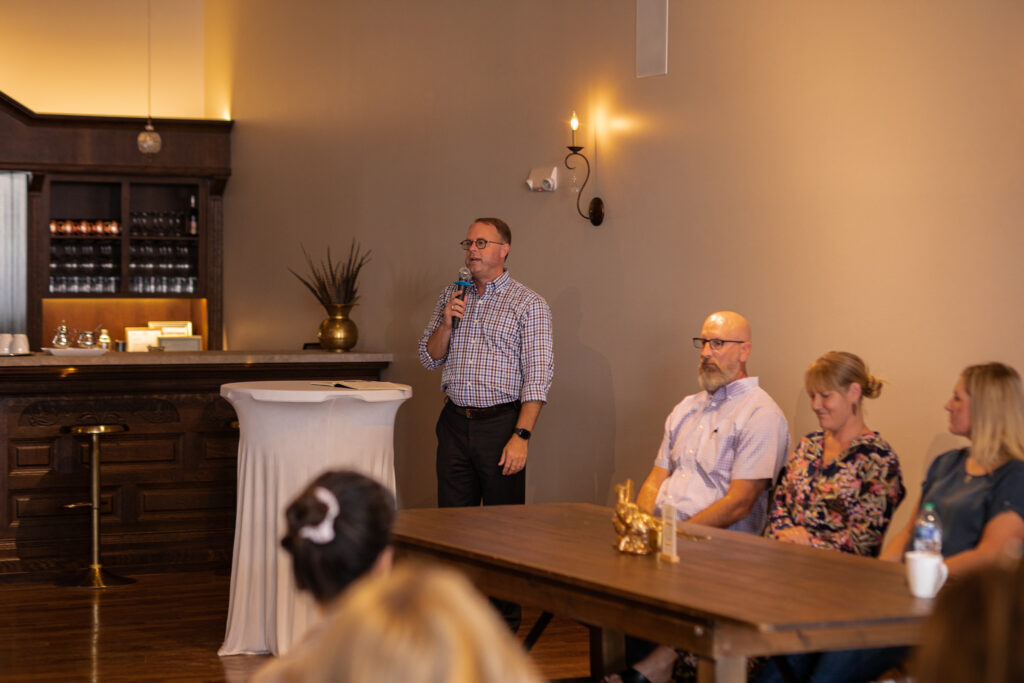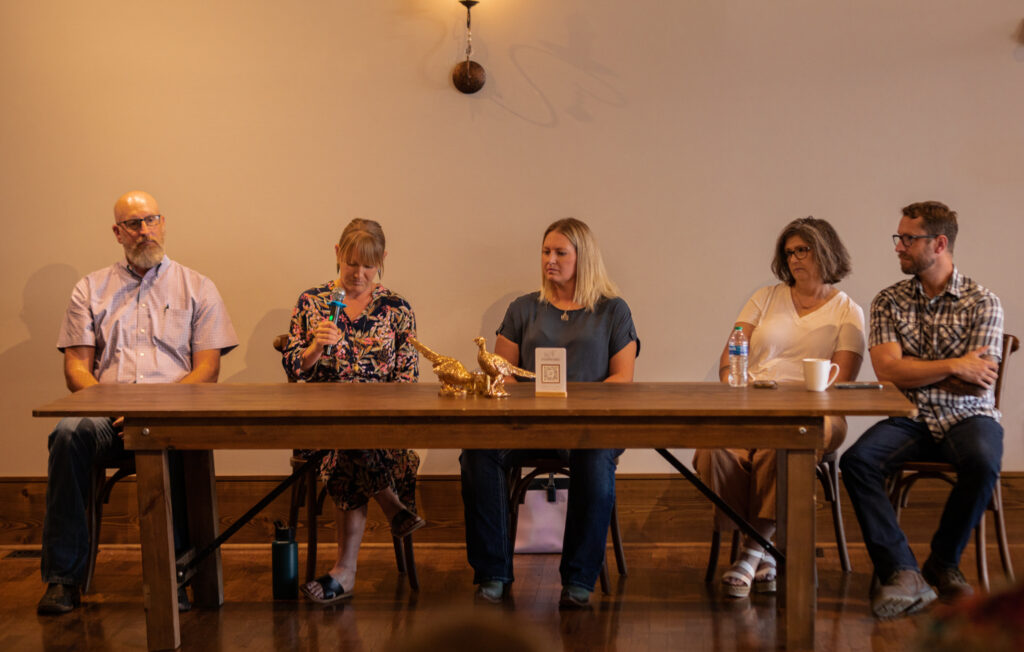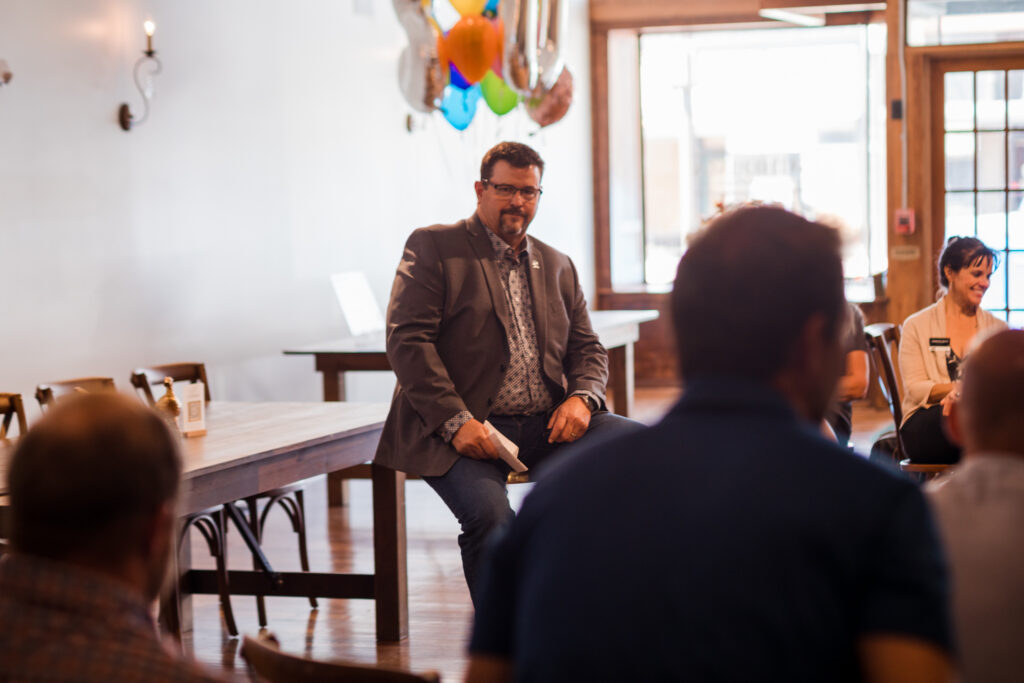Genesis 2.0 Day One
Thursday, August 24, 2023
Submitted by: Wendy Hughes
Sitting under the canopy in the Flint Hills, you could almost hear the voices singing; “Home on the Range” as Tom Moxly and Rich Porter gave us the history of their ranches. A listening session with these gentlemen started our second year of KARL off in Council Grove, KS. They ranch on the best grazing land in the world, land that has been there for more than 10,000 years and over 600 species of natural prairie plants. It use to stretch from Canada to Mexico and now is only in this part of Kansas. Tom explained that during severe drought, the Flint Hills saved the American Beef industry by being able to sustain cattle, not by having deep ponds, but by housing deep-rooted plants that can survive severe grazing. Both of these ranches have different ranching plans, but they were very adamant that you must have a plan to survive. They are friends. Their fathers were friends. They all have the same quote. ”It doesn’t matter how big you stay at the top, it’s how big you stay at the bottom” It is all a matter of risk and you must have a backup plan.
We met after lunch and started the session by singing happy birthday to our President, Jill Zimmerman. The Mayor of Council Grove, Debbie Swartzfeger, welcomed us by giving us an update of their quaint little town. They have had 24 new businesses start up in the last year and a half. Three years ago, the town did not even have a venue to hold 30 people and now there is a new donut shop going in. The hotel, The Cottage House, is the longest running hotel in Kansas and the Hays House restaurant is the oldest continuously ran restaurant west of the Mississippi.
Colene Lind, Associate Professor in the Miller School of Media and Communication, spoke with us about egocentric communication. We seem to be the only species that has figured out how to read what others think, causing miscommunication. When we as a group make others feel good, it gives good feelings to ourselves as well. Appreciation, obligation and accommodation are three things we must consider when working with others. Three things she left us with are: watch for opportunity to show appreciation, build-up others whenever you can and when you have to say no, show you are committed to something bigger.
We finished the afternoon off with our Talk5 presentations. We each gave a five-minute update of where life has taken us since our last session in March.
Tom Jones, owner and manager of High Plains Feed yard was our guest speaker after dinner at the newly renovated Territory Ballroom, where our sessions took place while in Council Grove. Tom spoke about his long hard trail to owning his own business, from whacking rats with a shovel, not seeing the back of a horse for three years to being able to attend Kansas State University. He went from being on the dean’s list of bad student to being on the Deans Advisory Council today. He has completed extensive research projects for the CDC and United Nations. He has worked with the dairy industry to develop a more muscular round for young steers for meat. He stated that he is currently working with Texas Tech University to develop genetic selection flavor in cattle. “Sometimes you have to just go for it and don’t be afraid of hitting the wall. There are lots of banks out there.”
Genesis 2.0 Day Two
Friday, August 25, 2023
Submitted by: Lindsey Ott
Council Grove, KS–Genesis 2.0 day 2 kicked off with a fantastic breakfast of coffee, breakfast burritos, and cinnamon rolls at our conference venue, the Territory Ballroom. After breakfast, we resumed our Talk5KARL presentations by starting with Danielle Kaminski and concluding with Adam York.
Our next session was a panel composed of local entrepreneurs:
· Bobby and Christy Alexander (Alexander ArtWorks, Council Grove, KS)
· Elle White (Grove Gardens, Council Grove, KS)
· Jacquelyn Leffler (Leffler Prime Performance, Americus, KS)
· Shane Tiffany (Tiffany Cattle Co., Herrington, KS)
J.J. Jones served as moderator.

In their introductions, the panelists describe the path they took to their current positions. Jacquelyn Leffler mentioned having blended interests in making a living including coaching sports and raising cattle for 4-Hers. She said that farming is a challenge with the economy so she didn’t plan to go into ag but instead it happened naturally and unintentionally.
Shane Tiffany discussed how he and his brother had an outside financier provide the funds to start a feedlot. His goal is to pay-it-forward and invest in local businesses. He also owns a grocery store, auto shop, and regenerative agriculture company.
Christy Alexander said “the storyline is never a straight-line” and that she and her husband had to make their own opportunity for art in their hometown. They started by making and selling stained glass in their garage. Then they outgrew this space and bought a place on Main street in Council Grove.
All of the panelist discussed the risks of starting a business in small town Kansas. For some, the plan was to fall back on previous job experiences (i.e., teacher, pastor) if their businesses didn’t succeed. As employers, the panelists discussed the need to treat their employees well, foster a positive work culture, and empower and delegate to their employees.
Christy Alexander discussed what motivated them as they started their business. They wanted to bring a different spirit to the downtown and prove to themselves and others that it was possible to succeed as a small business in a rural Kansas downtown.
All the panelist discussed the need to foster a positive relationship between the local businesses and the community, where local businesses give back to the community. And the need for local businesses to build synergistic partnerships with other local businesses.

Shane Tiffany mentioned an example of giving back – creating a low or 0% interest loan to support new businesses. During the discussion, J.J. Jones recommended the following books, “Start with Why: How Great Leaders Inspire Everyone to Take Action” by Simon Sinek and “Good to Great: Why Some Companies Make the Leap and Others Don’t” by Jim Collins.
The KARL team and guests broke for lunch at the historic Hays House where we enjoyed chicken fried steak, meatloaf, Cajun pasta, and shrimp salad. After lunch, Carl and Mary Ice spoke to our group. Carl Ice spent his career at BNSF and said that BNSF made leadership development a priority. Carl and Mary both prioritize leadership and community involvement. During his career, he always noticed what people gave their time to because this was a reflection of what they cared about. For him, he never cancelled a safety meeting at BNSF because he prioritized the safety of his employees and customers. A career in leadership involves some tradeoffs when balancing work and family. The Ice’s moved every few years while also maintaining community involvement like coaching and scout leaders. They really prioritize giving back to students with one example being Cats’ Cupboard at Kansas State University. 40% of college students are food insecure. In response, Cats’ Cupboard provides students immediate access to food and personal hygiene items at no cost.
Carl and Mary Ice are also involved in nature conservancy to maintain the remaining Tallgrass Prairie. When asked about the future of transportation, Carl discussed how technologies can be utilized by the transportation industry to improve working conditions and improve work quality. One example, is using technology to inspect the railroad track. He also discussed how railroads are good for the environment because they use less fuel than other means of transport. On the rail, 1 ton of freight is transported 450 miles using 1 gallon of fuel. While working with Berkshire Hathway, Carl was tasked with estimating the amount of freight transported between two US cities by BNSF. The result was that 15% of all freight transported between 2 US cities is handled by BNSF! Carl discussed his career path at BNSF – he worked there for 42 years where he started as an intern and became CEO. The Ice’s concluded their discussion by emphasizing how important education is at all levels and that we all need to spend time developing our passion and going out and doing something that is relevant and beneficial to others.
After lunch, we moved back to the Territory Ballroom for the final few events of Genesis 2.0. Russell Plaschka from the Kansas Department of Agriculture helped our class dive into what drives us as leaders. He asked us to reflect on the question, “What matters most to me?” and write it down on a 3×5 card. Then we broke out into teams of two, where we asked each other why that thing we wrote down on our card matters. This “why” question was asked five times. After the fifth “why”, that “why” was the ultimate thing that matters the most. “Leaders keep their eyes, minds, and heart on the true prize.” Then Russell asked us to answer the following 3 questions: How does this show up? What challenges do I face as I affect change? What am I willing to do about it?

Following our reflection on leadership, Russell facilitated the KARL class discussion and reflections on the last two days. He asked: “What is one thing you heard from the seminar?” KARL class members responded with the following answers: keep your dollars local, get involved, make conscious decisions and make a difference, help people see value in their community, don’t be afraid to fail, define success and failure, don’t succumb to imposter syndrome and be your authentic self, allow people space to grow and accommodate, do something that is relevant and you are passionate about, don’t have to agree to get along. He asked: “What made an impact?” KARL class members responded with the following answers: doing the Legacy interviews with family members that Nick Peters mentioned in his Talk5KARL; a change in perspective that things happen for us, not to us. He asked: “What are we going to do with the ideas/impacts of the seminar?” KARL class members responded with the following answers: work on implementing these ideas from now until our next meeting in November, use our drive home to reflect on the seminar and think up great ideas. In November, we will answer the question, “What did you start to implement?”
After a few closing remarks by Jill Zimmerman, we adjourned the seminar around 3 pm.